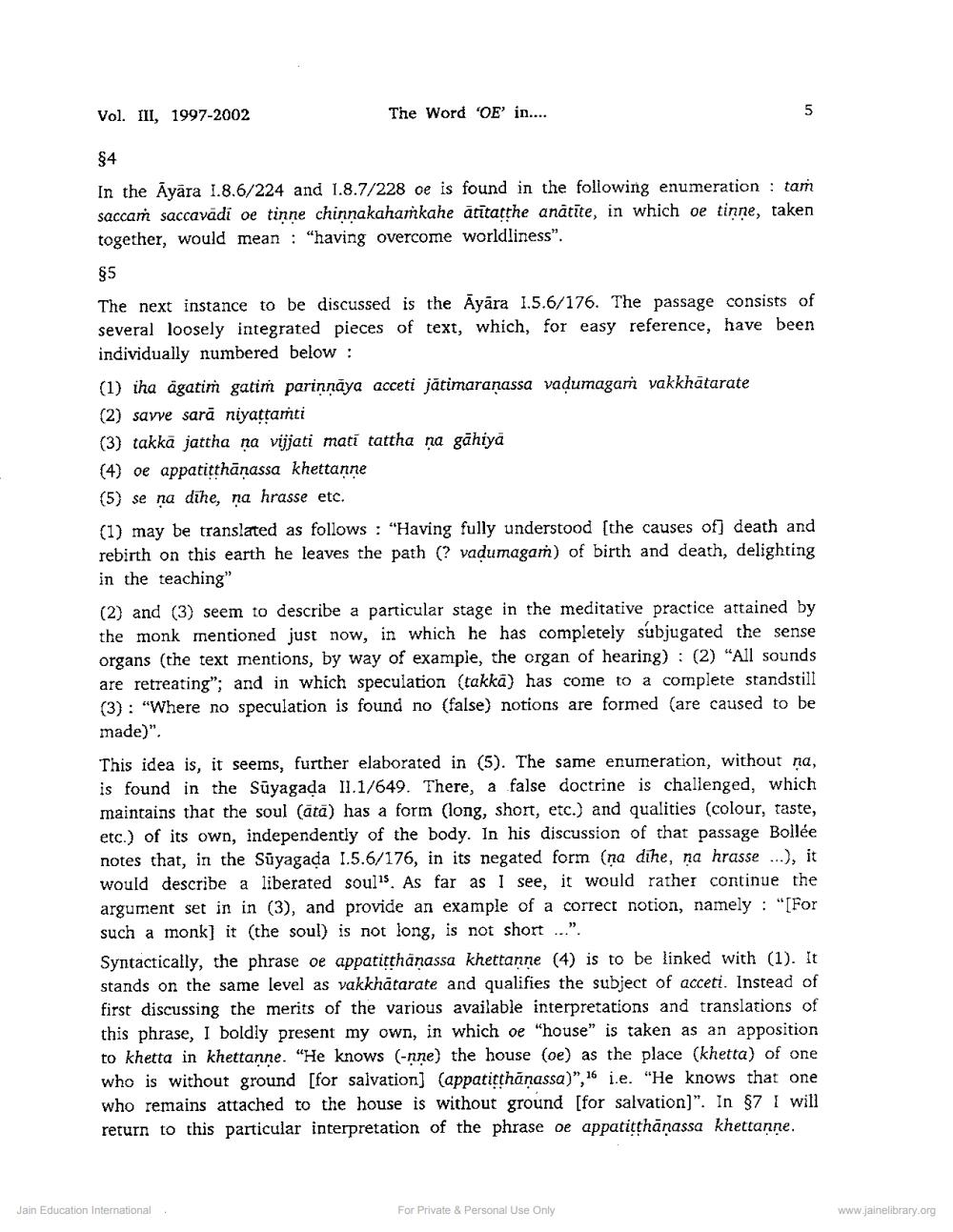Book Title: Word OE in Some Canonical Jaina Texts Author(s): Hermen Tieken Publisher: Z_Nirgrantha_1_022701.pdf and Nirgrantha_2_022702.pdf and Nirgrantha_3_022703.pdf View full book textPage 3
________________ Vol. III, 1997-2002 The Word 'OE' in.... 84 In the Āyāra 1.8.6/224 and 1.8.7/228 oe is found in the following enumeration : tam saccaṁ saccavadi oe tinne chinnakahamkahe atītatthe anātīte, in which oe tinne, taken together, would mean : "having overcome worldliness". 85 The next instance to be discussed is the Āyāra 1.5.6/176. The passage consists of several loosely integrated pieces of text, which, for easy reference, have been individually numbered below : (1) iha ägatim gatim parinnaya acceti jätimaranassa vadumagam vakkhătarate (2) savve sarā niyattamti (3) takkä jattha na vijjati mati tattha na gahiya (4) oe appatitthānassa khettanne (5) se na dihe, na hrasse etc. (1) may be translated as follows : "Having fully understood (the causes of] death and rebirth on this earth he leaves the path (? vadumagam) of birth and death, delighting in the teaching" (2) and (3) seem to describe a particular stage in the meditative practice attained by the monk mentioned just now, in which he has completely subjugated the sense organs (the text mentions, by way of example, the organ of hearing) : (2) "All sounds are retreating"; and in which speculation (takka) has come to a complete standstill (3): "Where no speculation is found no (false) notions are formed (are caused to be made)". This idea is, it seems, further elaborated in (5). The same enumeration, without na, is found in the Sūyagada 11.1/649. There, a false doctrine is challenged, which maintains that the soul (ata) has a form (long, short, etc.) and qualities (colour, taste, etc.) of its own, independently of the body. In his discussion of that passage Bollée notes that, in the Sūyagada I.5.6/176, in its negated form (na dihe, na hrasse ...), it would describe a liberated souls. As far as I see, it would rather continue the argument set in in (3), and provide an example of a correct notion, namely : “[For such a monk] it (the soul) is not long, is not short ...". Syntactically, the phrase oe appatitthänassa khettanne (4) is to be linked with (1). It stands on the same level as vakkhatarate and qualifies the subject of acceti. Instead of first discussing the merits of the various available interpretations and translations of this phrase, I boldly present my own, in which oe "house" is taken as an apposition to khetta in khettanne. "He knows (-nne) the house (oe) as the place (khetta) of one who is without ground [for salvation] (appatitthānassa)", 16 i.e. "He knows that one who remains attached to the house is without ground [for salvation)". In $7 I will return to this particular interpretation of the phrase oe appatitthānassa khettanne. Jain Education International For Private & Personal Use Only www.jainelibrary.orgPage Navigation
1 2 3 4 5 6 7 8 9 10 11 12 13 14 15 16
